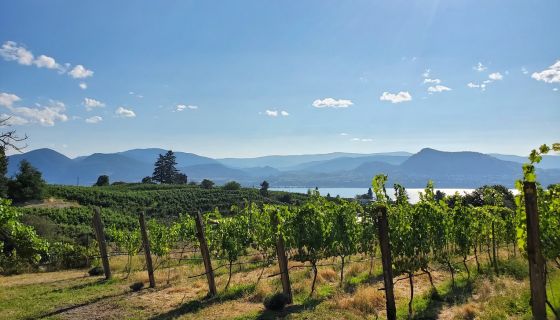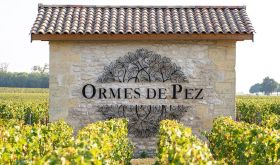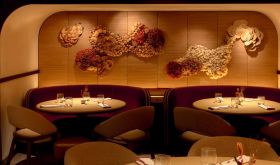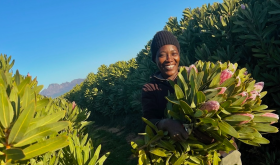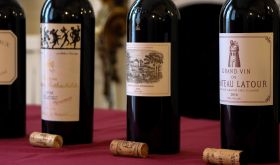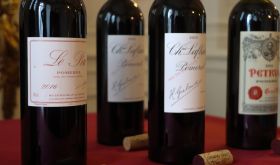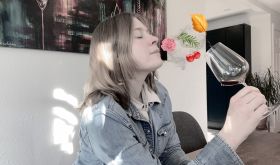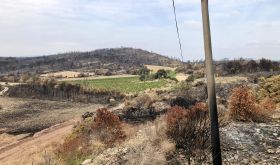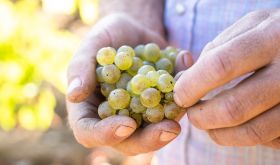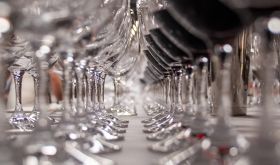There is an inexplicable feeling when walking into a great bar. There’s energy. Ambience. Young lovers give little importance to anything other than each other. Old friends are laughing and reminiscing on days long gone. You know a good time lies ahead, even before you feel the welcoming warmth of the room, or take the first sip of what could be a few beverages.
Tucked away in the Northern end of the Naramata Bench in the Okanagan Valley, you will find the same energy. Instead of lovers, a flock of ducks will announce your arrival. Instead of bantering old friends, happy pigs will be enjoying discarded fruit. Instead of a welcoming smile from the bartender, Buddha, the happiest English bulldog you will ever meet, will say hello.
‘Bubbles are friendly,’ says Jay Drysdale, the owner of British Columbia’s first all sparkling house, Bella Wines. ‘We often forget how versatile sparkling wines are, they are not just for celebration, they’re great for food and they’re just fun.’ Well said.
When Jay set out to start Bella with his wife Wendy, he was living every sommelier’s dream – move to wine country with the love of his life, and start what can only be a successful foray into winemaking. ‘I had no intention of buying land,’ Jay remarks as we stroll through his 5-acre farm, ‘but I love it, I’m more of a Farmer now than anything.’ Not only that, but according to Jordan Kubek of Lightning Rock Winery (another fantastic natural wine producer) across the Lake, Jay is seen as a local Sustainability Icon.
How did he get there in 7 short years? His guiding principle ‘I want to leave the land in better condition than when I found it.’ It’s a powerful sentiment.
Everything on the Bella Farm has a purpose. Three growing pigs eradicate 100% of the organic waste from the winery and even from a local restaurant. The ducks & chickens will pick away at grasses and pests, all the while, leaving fertilizer, for the plants and food for the humans. It’s no coincidence that the block of vines that houses the pigs are the healthiest and most vibrant of them all – ‘It all comes back to poo,’ says Jay. Maybe a future title to his autobiography.
Apple, plum, apricot, and cherry trees line the vines to increase biodiversity. We step over field peas and buckwheat as I jealously glimpse into his 100x20 foot garden. All animals, birds of prey, badgers, voles, bear, deer, has their part to play.
What’s the result of all this care?
Natural sparkling wines in both traditional and ancestral methods. Jay focuses on single vineyard expressions of Chardonnay and Gamay to develop a true understanding of his land. The farm’s energy carries over into his wines in various traits; balanced acidity, complexity, length, and what we all want in bubbly, freshness.
‘The lack of money forces us to be creative,’ says Jay. You can see that in some of his wines, like his ‘Trad-Nat’ series. He ages his base wine, and then adds freshly pressed juice from the same vineyard the following year, to spur a secondary fermentation in bottle. The result is a sparkling wine with truly nothing added or taken away.
After his days as a chef and a sommelier, Jay was educated in Enology at Washington State University and questioned his teachings early on. He would repeatedly ask ‘Why do we add all these ingredients? Is it to make the wine better or our jobs easier?’ When he realized the majority of additives were for the latter, his natural wine philosophy burgeoned from there.
It’s an all-encompassing approach for Jay. When guests visit the winery, they don’t line up in the tasting room for a quick splash. Jay personally takes them on a Farm Tour, showing the animals and garden vegetables as an integral piece of the puzzle. He speaks to the dangers of monoculture, and the importance of soil health. He does Food Talks, a monthly dinner series with his loyal restaurant customers, where he shares the floor with a local farmer so the guests can learn both about the food and the wine.
I’ve had the pleasure of meeting a few winemakers with similar philosophies and there is a shared humility amongst them. They focus on farming the best quality fruit and the wine just makes itself. I find it hard to believe it’s that easy.
Jay’s biggest challenge – guidance. British Columbia is young, it’s only been producing vitis vinifera grapes for 30 to 40 years, and there are no other biodynamic growers on the Naramata Bench that Jay can go with questions.
The Okanagan Valley stretches for 250km North to South, so while there are a small number of sustainably focused wineries that Jay calls upon for help, everyone has their own microclimate. ‘We lost 120 years of farming knowledge because of the agro-chemical industry,’ says Jay when he refers to how easy it is to find chemical solutions with ikea-like instructions yet there are little affordable resources in how to properly use wild herbs or the like.
But there is a shared hope. Both Jay and Jordan spoke about the future with zeal. The Okanagan Valley has so much potential for sustainable farming. It’s warm, dry, and windy, which means little disease pressure. The numerous and large freshwater lakes make sourcing irrigation easy and cheap. The winters are cold enough to kill off any bad bacteria that will come back to haunt the vines come Spring. And it has +/– 50 growing degree days as Napa Valley, so that must be a good sign
Although today, B.C. has less than 5% organic growers. At less than 11,000 acres under vine, if just a couple of the larger producers farm more sustainability, B.C. could potentially garner the highest proportion of organic vineyards in the world.
The environment has garnered more attention than ever before, and rightly so. Through the effects of this pandemic, we’ve seen Mother Nature begin to heal herself. According to Lauri Myllyvirta of Finland’s Centre for Research on Energy & Clean Air ‘It is quite likely more than 10% of total oil consumption globally has been wiped out and is has meant that many cities are measuring the best air quality they have ever seen. This crisis could be a big opportunity to reduce emissions in the longer term.’
With every coming day, we care more about what we consume. It’s an upward trend and hopefully is one to stay. At the very least, I’ll practice Jay’s Gospel, head to the local Farmers Market (with a mask on of course), and return home to chilled bottle of sustainably produced bubbly for the soul.
To learn more about Bella Wines, I encourage you to visit their refreshingly transparent and truly informative website. I would like to thank Jay for his time, patience, and dedication, and also thank you to Jordan at Lightning Rock for an always-invigorating visit.

